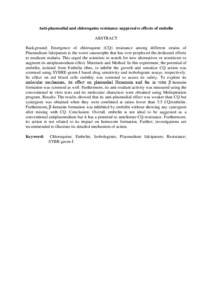Citation
Oi, Zaid and Abd Majid, Roslaini and Abdul Majid, Hasidah and Md Noor, Sabariah and K., Al-Zihiry and Rahi, Sattar and Basir, Rusliza
(2017)
Anti-plasmodial and chloroquine resistance suppressive effects of embelin.
Pharmacognosy Magazine, 13 (supp. 1).
48 - 55.
ISSN 0973-1296; ESSN: 0976-4062
Abstract
Background: Emergence of chloroquine (CQ) resistance among different strains of Plasmodium falciparum is the worst catastrophe that has ever perplexed the dedicated efforts to eradicate malaria. This urged the scientists to search for new alternatives or sensitizers to augment its antiplasmodium effect. Materials and Method: In this experiment, the potential of embelin, isolated from Embelia ribes, to inhibit the growth and sensitize CQ action was screened using SYBRE-green-I based drug sensitivity and isobologram assays, respectively. Its effect on red blood cells stability was screened to assess its safety. To explore its molecular mechanism, its effect on plasmodial Hemozoin and the in vitro β-hematin formation was screened as well. Furthermore, its anti-oxidant activity was measured using the conventional in vitro tests and its molecular characters were obtained using Molispiration program. Results: The results showed that its anti-plasmodial effect was weaker than CQ but synergism was obtained when they were combined at ratios lower than 5:5 CQ/embelin. Furthermore, β-hematin formation was inhibited by embelin without showing any synergism after mixing with CQ. Conclusion: Overall, embelin is not ideal to be suggested as a conventional antiplasmodium but it has a potential to ameliorate CQ resistance. Furthermore, its action is not related to its impact on hemozoin formation. Further, investigations are recommended to illustrate its detailed mechanism of action.
Download File
![[img]](http://psasir.upm.edu.my/60900/1.hassmallThumbnailVersion/Anti-plasmodial%20and%20chloroquine%20resistance%20suppressive%20effects%20of%20embelin.pdf)  Preview |
|
Text (Abstract)
Anti-plasmodial and chloroquine resistance suppressive effects of embelin.pdf
Download (102kB)
| Preview
|
|
Additional Metadata
Actions (login required)
 |
View Item |

